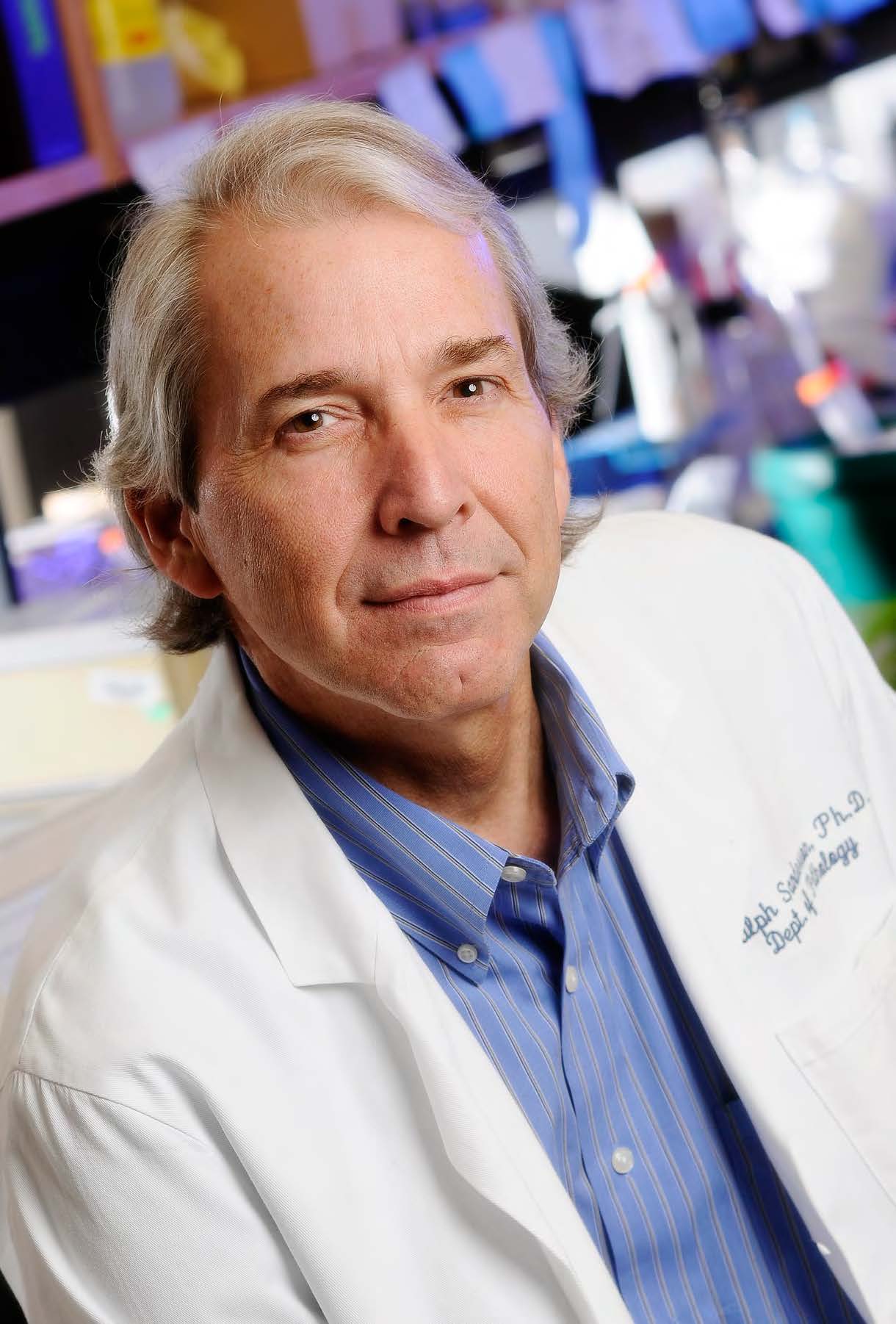 by Hannah Buckelew
by Hannah Buckelew
Ralph Sanderson, Ph.D., Professor, Molecular and Cellular Pathology, will retire August 31, 2023, after 17 years of service at UAB and 34 years in the field of pathology.
Sanderson earned his Bachelor of Science in Biology from the University of Alabama in 1975 and his Ph.D. in Cell Biology from UAB in 1986. He became a postdoctoral scholar at the Stanford University School of Medicine’s Department of Pediatrics before joining the faculty as assistant professor of pathology at the University of Arkansas for Medical Sciences (UAMS) in 1989. Sanderson became an associate professor in 1995 and the Director of the Division of Experimental Pathology in 1998. In 1999, he became both a senior scientist at the UAMS Myeloma Institute for Research and Therapy and the Director of Basic Research in the Arkansas Cancer Research Center. Sanderson was promoted to professor of pathology, neurobiology and developmental sciences in 2000 before being named the Drs. Mae and Anderson Nettleship Endowed Chair in Oncologic Pathology in 2002.
Sanderson joined the UAB Department of Pathology as professor in 2006. He became a senior scientist at the O’Neal Comprehensive Cancer Center, the UAB Center for Metabolic Bone Disease and the UAB Comprehensive Arthritis, Musculoskeletal and Autoimmunity Center. In 2012, Sanderson was named the UAB Endowed Professor of Cancer Pathobiology, and in 2018, the Division Director for the Department of Pathology’s Division of Molecular and Cellular Pathology.
A passionate educator and mentor, Sanderson was the founding director of the Pathobiology and Molecular Medicine graduate theme and served as co-leader in the O’Neal Comprehensive Cancer Center’s Cancer Cell Biology Program. He has served as mentor and advisor for more than 110 medical, graduate and postdoctoral students, and nearly 20 junior faculty members. He has served as lecturer for course topics ranging from cancer metastasis and microenvironment to glycosylation in health and disease and biology of neoplasia.
“Ralph is a friend, colleague and inspirational mentor for many trainees, staff and faculty. I want to thank him for exemplary leadership of the Division of Molecular and Cellular Pathology,” says Rakesh Patel, Ph.D., Division Director, Molecular and Cellular Pathology. “His contributions to the Department of Pathology and O’Neal Comprehensive Cancer Center have been instrumental in faculty recruitment and their career development which have not only contributed to our department’s success in research, but also established a strong foundation for sustained growth in this area. We wish him all the best in retirement.”
In addition to his contributions to education, Sanderson is a prolific researcher. His research has determined the role of heparan sulfate proteoglycans and heparanase in regulating the growth and metastasis of tumor cells which has identified new mechanisms and therapeutic targets for treating multiple myeloma. Sanderson has authored more than 130 manuscripts and given nearly 60 major lectures. He has received consistent grant support from the National Institutes of Health for more than 30 years and holds memberships in several professional societies, including the American Association for Cancer Research, American Society for Matrix Biology, American Society for Biochemistry and Molecular Biology and International Society for Extracellular Vesicles.
“Ralph has been a great contributor to all missions of the O’Neal Comprehensive Cancer Center through his own research efforts and through his stewardship and mentoring of young research faculty working in cancer research,” says Barry Sleckman, M.D., Ph.D., Director, O’Neal Comprehensive Cancer Center. Sanderson was awarded the Albert F. Lobuglio Distinguished Faculty Award by the O’Neal Comprehensive Cancer Center in 2017.
After retirement, Sanderson will continue as a co-investigator for several NIH grants and as a mentor for faculty and trainees. He plans to continue writing and publishing in his research field. Retirement will give him more time to relax in Navarre Beach with his wife, play golf with his friends, spend more time with his five grandchildren and catch up on non-scientific reading.